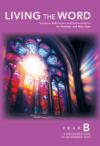Scripture Study for
Second Sunday in Ordinary Time
Isaiah 62:1–5 / Psalm 96:3 / 1 Corinthians 12:4–11 / John 2:1–11
<< Back to LECTIONARY RESOURCES
Understanding the Word
By Br. John R. Barker, OFM
Isaiah’s post-exilic passage focuses on the healing of Israel’s relationship with God, which had been severely damaged by centuries of infidelity, culminating in a period of judgment now coming to an end. This healing will be manifested publicly by the restoration of Jerusalem and the surrounding area. (“Land” signifies the people also.) Just as the destruction of Jerusalem and the exile of the people had been seen by other nations, so shall the restoration, which the nations will behold as it “shines forth like the dawn,” like “a burning torch.” The land—and Israel—will no longer be known as forsaken or desolate, but as God’s delight and God’s beloved “spouse.”
In his First Letter to the Corinthians, Paul emphasizes the profit and the dangers of the manifold spiritual gifts that God bestows on the church. The Corinthians apparently were well provided with such gifts, but this abundance had led to pride and division. Here Paul notes that the various gifts all come from the same Spirit, which means that they are inherently unified and unifying. Pride is ruled out by the fact that the ability to prophesy or heal or interpret tongues is an unmerited divine gift, not something one has earned or can claim to “possess.” Rather, all are distributed by the Spirit according to the mysterious will of God.
In the Gospels, and especially in John, the “wondrous deeds” of Jesus are “signs” of underlying realities. At the wedding at Cana, when Jesus changes water into wine, it is true that he exhibits charity by “saving the day.” More importantly, his action is also a revelation of God’s abundant generosity and the fulfillment of God’s promises to provide for the people. Water is necessary for life, but wine represents the gifts of God that go beyond necessity. Jesus himself is the perfect and complete manifestation of God’s abundant and joyful gifts to all who accept them. He is the “wine” that God provides for people to give them “abundant life” (John 10:10).
